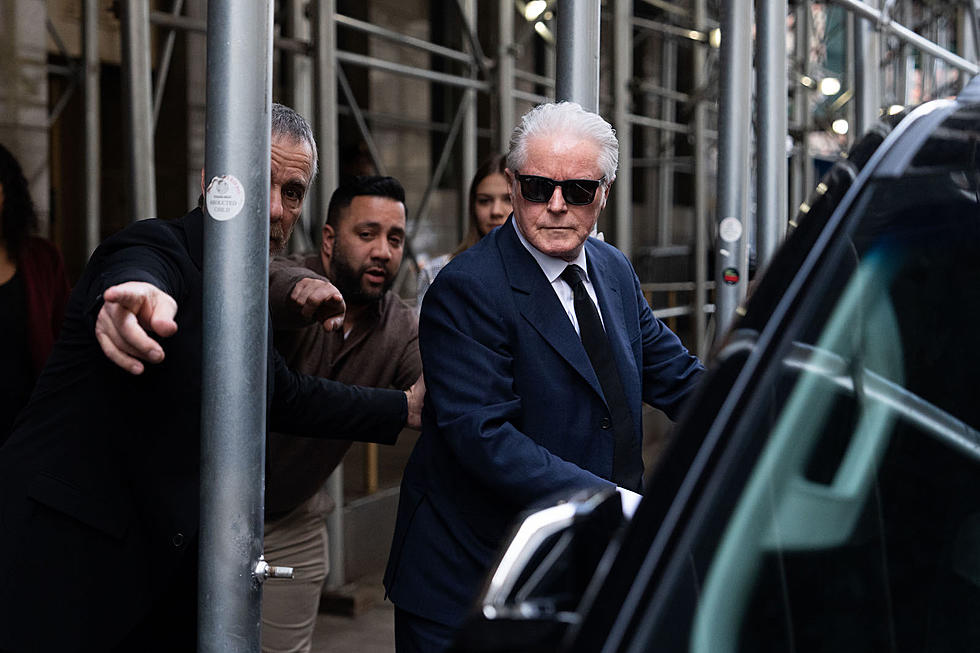
Don Henley Calls Teen Overdose Questioning a ‘Sideshow’
Don Henley returned for a second day of testimony on Tuesday during a criminal case in Manhattan involving nearly 100 pages of allegedly stolen Eagles lyrics from the Hotel California album.
Rare books collector Glenn Horowitz, former Roll & Roll Hall of Fame curator Craig Inciardi and rock auctioneer Edward Kosinki have each been charged with one count of conspiracy in the fourth degree, for which they could receive a maximum sentence of four years in prison. Horowitz has been separately charged with first-degree attempted criminal possession of stolen property, as well as two counts of hindering prosecution. Inciardi and Kosinski are also charged with first-degree counts of criminal possession.
On Monday, Henley first answered questions about his conviction following a teen escort's overdose at his home in 1980, an incident he described as "a poor decision that I regret to this day." He was then cross-examined by defense lawyer Jonathan Bach about his conversations with writer Ed Sanders, who was tasked in 1980 with writing a biography of the Eagles.
Henley says he granted Sanders physical access to his materials at the time, including legal pads of lyrics, but that he understood that the pages still legally belonged to the Eagles. This belief was based on a 1979 contract signed by the band and Sanders stating that the writer had permission to shop the book to various publishers, but the content remained property of the Eagles.
Then in 2012, Henley became aware that lyric pages were appearing on auction sites. Henley initially bought them for $8,500, but when more pages appeared in 2014 and 2016, Henley chose not to purchase more. "I'd already been extorted once," he said on Monday. "I wasn't going to do it again."
In each instance, Henley contacted his attorneys and filed a police report and in each instance, the documents could be sourced back to Sanders. Sanders reportedly sold five legal pads of lyrics to Horowitz for $50,000. Horowitz then allegedly sold them to Inciardi and Kosinski for $65,000.
Longtime Eagles manager Irving Azoff testified on Feb. 21 to the existence of the contract between the band and Sanders, but said he did not know whether Sanders was aware that his selling of the pages was a violation of the contract.
Defense attorney Jonathan Bach presented several items of evidence on Monday that indicated Henley willingly sent materials, including lyric pads, to Sanders at his home in Woodstock, New York. This would seem to indicate that Sanders did not remove them illegally from his property in Malibu, California, as Henley alleges. Through his cross-examination, Henley maintained that he does not have an independent recollection of making offers to Sanders that involved material leaving Los Angeles.
Henley was then questioned further on Tuesday about the incident involving the underage girl in 1980, this time by Kosinski attorney Scott Edleman. Henley maintained that he and the girl did not have sexual intercourse.
He became visibly frustrated when Edleman proposed that "making love," a phrase Henley used in a letter to the probation office in the early '80s, could include sexual contact. "Making love is a very broad term, sir," Henley said, calling the topic in question "a sideshow."
Henley was also asked questions about his relationship with drugs during this period of his life, and seemed to become irritated again. "Sex, drugs and rock 'n' roll is not regulatory," Henley replied, noting he and those around him intermittently used cocaine. "I was always lucid when I did business."
When pressed about his history of litigation in relation to the Eagles, Henley stated: "There's a lot of litigation in the record business, sir, because people take advantage."
Multiple new pieces of evidence were admitted in court, including a 2017 email exchange between Henley, Azoff and Glenn Frey's widow, Cindy. Henley describes a former girlfriend of Frey's as a "little bitch" who was "in Playboy magazine" after apparently learning of her intent to sell pads of lyrics given to her by Frey. Henley testified that he did not independently recall these emails.
Henley was also asked to review several documents that had been seized from Sanders' home by the New York District Attorney's office, including a financial statement of Henley's from 1975 and a limousine bill from 1973 on which Henley's handwriting appeared. The defense argued that this meant Henley was aware of how much and what kind of sensitive material Sanders had been given.
Henley maintained that he does not recall making those decisions, nor whether he or anyone else within the organization ever requested the return of the materials. "I trusted the guy," he said. Henley also admitted that he didn't know whether or not he or his lawyers had ever informed Kosinski about the existence of the 1979 contract.
Based on a series of emails from 2012, 2014 and 2016, the defense asserted that at no point in time was the '79 contract ever mentioned to Sanders, Kosinski or his lawyers, though Henley testified that he did not recall bringing up the subject of the contract or asking his lawyers to relay the information.
Moments of humor peppered Tuesday's proceedings. When asked by Stacey Richman, attorney for Inciardi, about pins that were distributed to female audience members at Eagles concerts in the '70s as post-show party invitations, Henley denied knowledge of them but added "that's a good idea."
Following defense cross examination, another tape was played for the court by the prosecution in which Sanders could be heard talking with Henley about the book research materials, saying "I don't want to own them."
Henley continued to assert his understanding that Sanders was never given permission to keep the documents in his possession and sell them.
"If you've got a tape of that," he said, "play it for me."
Eagles Albums Ranked
Gallery Credit: Nick DeRiso




